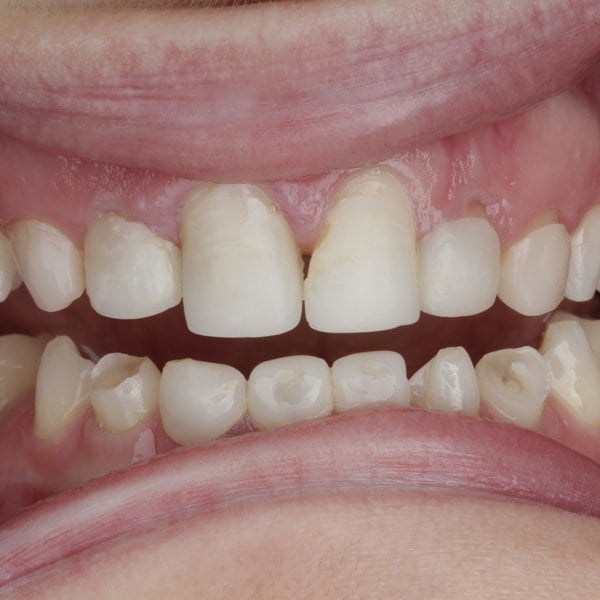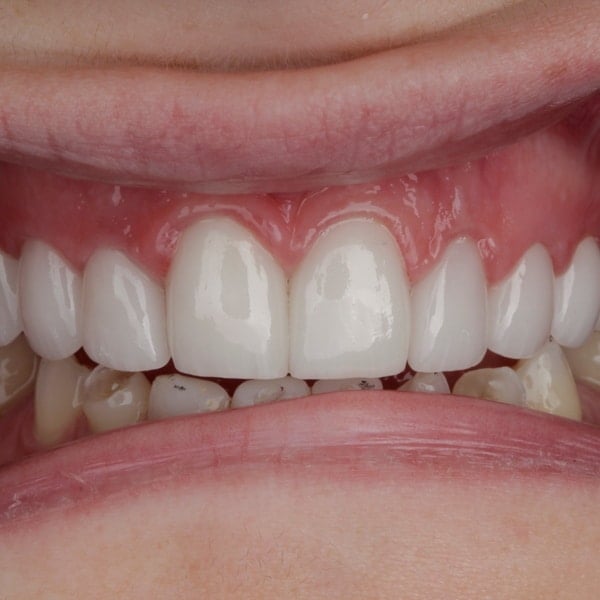Genetic Dental Conditions
Genetic dental conditions can affect you throughout your life, but you don’t have to handle them alone. Middle Tennessee Prosthodontics is here for you, and our team is highly trained in treating genetic dental conditions.
We treat patients of all ages with various dental conditions, using prosthodontics, advanced cleaning routines, and cosmetic dentistry solutions. You and your family members don’t have to live in pain or shame. Contact our office to find solutions to your genetic dental conditions.
We take an interdisciplinary approach, working as a team with pediatric dentists, surgeons, and orthodontists to restore function and esthetics.


Understanding Genetic and Inherited Dental Disorders
Genetic dental disorders are issues with your teeth that are caused by your DNA. You are born with them, and they require management throughout your life. Some genetic dental disorders can be inherited from your parents, while other times, the gene mutation starts with you.
Genetic dental issues can cause a variety of issues, such as:

Diagnosing Your Genetic Dental Disorder
Most often, a dentist is the first to notice signs of genetic dental disorders during a pediatric visit, after which they may refer the child to a primary care doctor for diagnosis.
One way a primary care doctor can diagnose your genetic condition is through genetic testing. This process uses your saliva to analyze your genes and detect serious genetic anomalies. Your dentist and primary care doctor can use your specific information to customize a long-term plan for you.
Genetic testing allows us to create a plan that isn’t just a band-aid solution; it is a plan that is custom and long-lasting. While genetic testing is still a fairly new technology, it has the potential to revolutionize how we treat genetic dental concerns.
Our team understands the importance of working with other specialists and your primary care doctor to help you receive holistic care and a proper diagnosis.
If your child has been tested for a genetic dental disorder, our prosthodontists can work with your primary care provider to properly care for your child’s teeth from an early age—working around any dental disorders. We welcome children in for cleanings and prosthodontic care.

Common Genetic Dental Issues and How We Treat Them
Many genetic dental issues have complicated names that make them sound scarier than they are. We seek to make your dental treatment of genetic disease simple and comfortable. This list includes a common name and its scientific name so you can understand what you might be dealing with a bit better.
We care for patients with genetic conditions that affect their teeth, like amelogenesis imperfecta, dentinogenesis imperfecta, and ectodermal dysplasia. Using a team-based approach with other dental specialists, we create personalized solutions to restore comfort, function, and confidence—one smile at a time.
– Dr. Stephen Peterman
Am I At Risk for a Genetic Dental Disorder?
Family Ties and Oral Health
Understanding your family’s past dental history can help you know what to look out for in your smile and in your children’s smiles. Some genetic conditions, such as ectodermal dysplasia and amelogenesis imperfecta, can be passed down to children.
When you come in to visit our office over a genetic concern, we will ask you about your family’s dental history. These questions are especially pertinent when it comes to grandparents and parents. We may ask questions such as:

- Do you know if your family has a history of genetic dental disorders? If so, do you know what they are?
- Do any of your family members exhibit teeth that are discolored, pitted, or of an odd shape?
- If you have children, have they shown signs of or been diagnosed with a dental disorder?
- Has anyone in your family had teeth that never grew in or had too many teeth that had to be removed?
If you answered yes to one or more of these and are struggling with poor oral health or cosmetic issues, your concerns might be linked to a genetic tooth issue.
Keep in mind that some dental issues, such as receding gums or crooked teeth, can be passed down by family, but they are not a genetic disorder.
Receive Oral Care for Genetic Dental Conditions with Our Team
Our office is the only prosthodontist within a 400-mile radius of Brentwood, Tennessee. If you are looking for solutions for your dental needs, we can help!
Our judgment-free office has a variety of custom solutions for your smile. We understand you might be nervous, which is why we can set up a no-strings-attached consultation for you to learn more about how we can help your smile look and feel its best, no matter what conditions may be affecting your teeth. Reach out for a consultation today.